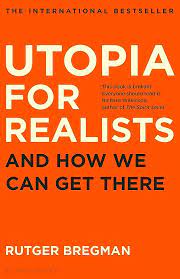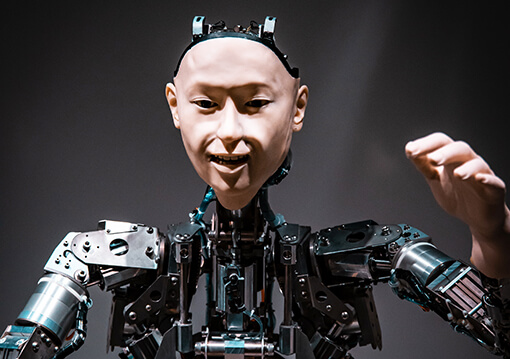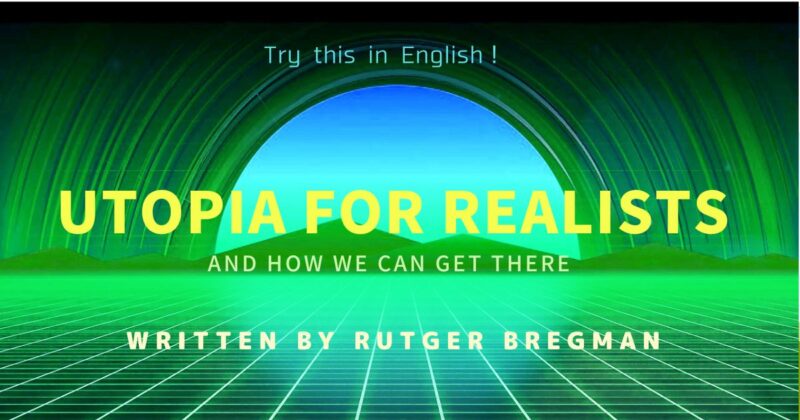Hello! It’s konkaz (@konkazuk) here.
The book I am introducing this time is “UTOPIA FOR REALISTS“ written by “Rutger Bregman“, a Dutch historian and journalist.

(Unfortunately, as of now, a Japanese translation has not been released.)
The book discusses…
the wealth gap and its factors and background up to the present day in the 21st century. It also explores ideas on how to create a society where those who genuinely contribute to it receive their deserved rewards.

Living in a modern society where a multitude of information circulates, essential aspects often become obscured. I believe this is a book that everyone should read.
So, for those who are interested, please have a look.
Humanity has already reached the “Utopia”

To begin with,
since the Industrial Revolution, the quality of human life has dramatically improved, and living in the 21st century, we have already reached the “Utopia” that our ancestors once dreamed of.
What was once considered a “luxury” accessible only to a handful of powerful individuals has now become “ordinary” for modern people.
This sets the stage for the book.
Now that ‘Utopia’ has been achieved, we, as modern individuals, seem to have lost the dreams we once pursued…
In other words,
Utopia = Dystopia [dɪstəʊpiə]
has been realized.

“Dystopia” is the antonym of “Utopia,” representing an anti-ideal society, in other words, a “dark world“.
Therefore, our current situation has become one where we can do nothing but narrate, “Back in the old days, people’s lives were incredibly miserable.”
The British philosopher Bertrand Russell (1872-1970) said the following:
Man needs, for his happiness, not only the enjoyment of this or that, but hope and enterprise and change.
Furthermore…
It’s not a finished Utopia that we ought to desire, but a world where imagination and hope are alive and active.
In other words, our true sense of happiness comes from the state of moving towards utopia.
The author suggests that what we need now is a “new map for discovering utopia,” and that this new utopia should be the act of “getting rid of inequality from the world“. Let’s all work towards that goal together!
How can we eliminate poverty?

In conclusion, it is said that the most effective way to eliminate poverty is to give away ‘free money‘ to those in poverty.

Some might have found it like… ‘What…? Free money? … It can’t be!!!'”
In reality, experiments involving giving money to impoverished populations have been attempted in several countries in the past.
The results consistently show that when unconditional cash is provided to the poor, they tend to spend it on essential needs, start businesses, and make responsible financial decisions, rather than squandering it on unnecessary items.
On the contrary, results from various studies consistently show that the annual cost incurred by issues related to their drug and alcohol consumption is several times higher than distributing free money.
People living in developed countries above the poverty line may find it challenging to accept the idea of distributing money to those not working, with thoughts like, ‘Why give money to those who aren’t working?’ or ‘Giving money to the poor will only encourage laziness.’
The already-established experimentally proven ‘win-win’ concept faces difficulty gaining acceptance from those who harbor prejudice.
Universal Basic Income

Until a short while ago, when wars were frequent, GDP (Gross Domestic Product) was used as a yardstick to measure the growth of a country.
However, in the current world where wars have become relatively infrequent (although regrettably, as of now, conflicts have arisen in places like Ukraine and Israel), measuring the prosperity of humanity by using dollars, pounds, or euros is becoming outdated.
Therefore, in this present age, we need to reconsider what defines ‘growth’ and ‘progress’ for us now.
In contemporary society, there is a trend where jobs on the financial side, which don’t necessarily create tangible value, have increased. As a result, the system that makes these financial jobs lucrative has been established.
Moreover, as individuals become wealthier and more knowledgeable, humans tend to consume even more.
In a competitive society obsessed with “efficiency” and “productivity,” the true value of fields contributing to societal well-being, such as “education” and “healthcare,” has become less visible, unfortunately.
Despite an improvement in the standard of living over time, the working hours for low-income individuals with jobs contributing to society are increasing.

There are often strikes led by teachers demanding salary increases in the schools where my children attend and I can completely understand why.
No matter how fulfilling the job of a teacher may be, if the compensation doesn’t match the workload and they have to lead a challenging life, it ultimately leads to a loss of motivation, resulting in a decline in the quality of education.
And the survey results reveal that what many people desire is less working hours rather than more income.
People who work hard to contribute to our society find themselves bound by time indefinitely, while those merely circulating money continue to amass wealth. If we allow this system to persist, where the affluent engage in repetitive cycles of consumption, the gap of inequality will only continue to widen.
The author appeals that since society is composed of everyone, it’s time to stop focusing on individual victories. and instead, the country should adopt a “Universal Basic Income” system, ensuring that everyone can enjoy a certain standard of living.
Race against the machine

If automation continues at this rate, society will be flooded with unemployed individuals, leading to further inequality,
When online sellers like Amazon come into power and everybody starts using their platform for shopping, the chances for individual stores to survive will become slim.
The 19th-century British economist Alfred Marshall expressed the following:
The smaller the world gets, the fewer the number of winners.
and economists refer to this phenomenon as a…
“Winner-take-all society“

It was a while ago, but I remember giving an Amazon gift card for my son’s classmate’s birthday and mom of the classmate declined, stating, “We have our policy of not using Amazon.” So, we exchanged it for cash instead. I was impressed by their commitment to their principles.
In the past, despite the loss of many jobs due to the advancement of automation, new jobs were also created at the same time and it had kept the balance.
However, as we entered the 21st century, this balance began to be disrupted, and the gap has been widening rapidly.
As a result, it is said that while jobs requiring extremely high skills and those requiring no skills at all remains, the ones with average skill requirements are gradually declining.
Robots don’t get sick, don’t take time off, and never complain. However, if the advancement of automation is pushing many people into low-paying and undesirable jobs, it poses a significant problem.
Therefore, the author argues,
We must firmly consider creating a societal system where the benefits of this Second Machine Age reach not only the winners but everyone, including the losers.
And he emphasizes that the only way to achieve this is through the Redistribution of money,
in other words, by introducing a…
“Universal Basic Income” system!
Remove the borders!

The author’s aspiration to eliminate inequality goes beyond the boundaries of advanced countries.
While living in a utopian society, where ideas like Universal Basic Income and a 15-hour workweek are promoted, , it’s crucial to acknowledge the stark reality that numerous individuals worldwide are still subjected to living on just one dollar per day.
Here, the author appeals…
Shouldn’t we be focused on activities aimed at bringing the prosperity of our current lifestyle to a point where it can be shared by people worldwide as the ultimate goal?
The state of our current world is as follows:
⚫ The extremely affluent, constituting 8% of the global population, earn approximately half of the world’s income.
⚫ Among them, 1% owns over half of the world’s wealth.
⚫ The poorest 1% in the world consumes only 1% of global resources.
⚫ The wealthiest 1%, on the other hand, consumes 72% of the world’s resources.
From an international perspective, it becomes evident that the affluent in developed countries are not just wealthy but with a disgusting level.
Here, the author points out that while inequality in the 19th century was largely based on class, the current inequality is significantly influenced by geographic factors.
The author boldly suggests that…
breaking down borders is a breakthrough in the global fight against poverty!
However, unfortunately, people in developed countries often possess the following prejudices when it comes to immigrants…
1. They are all terrorists!.
2. They are all criminals!
3. They will undermine social cohesion!
4. They will take our jobs!
5. Cheap immigrant labor will force our wage down!
6. They are too lazy to work!
7. They will never go back to their home countries!
The author not only demonstrates in the book that these biases are all baseless but also helps readers understand that ultimately, everything stems from the issue of economic inequality.
Considering the resentment generated by the actions of countries like the United States and the United Kingdom in the Middle East, the idea of “removing their own borders” seems like an impossible dream.
However, the author passionately argues that if you truly want to achieve things, keep holding onto “unrealistic,” “irrational,” and “impossible” ideas!
In summary, this book offers a remarkable perspective on the era we are currently living in, urging us to reevaluate, on a grand scale and from an objective standpoint, the future of our children and the existing inequalities in the world.
If you’re interested, please check the link below. 👇
Well, it was a super concise summary of “UTOPIA FOR REALISTS” by Rutger Bregman.
Thank you for reading until the end.
Bye now,
konkaz
You can read this blog post in Japanese from the link below.
👉 UTOPIA FOR REALISTS: ルトガー・ブレグマンのアイデアを探る

